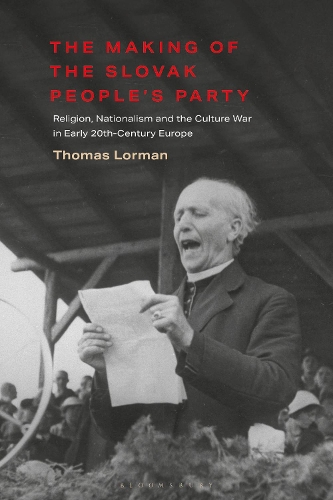
The Making of the Slovak Peoples Party: Religion, Nationalism and the Culture War in Early 20th-Century Europe
(Hardback)
Publishing Details
The Making of the Slovak Peoples Party: Religion, Nationalism and the Culture War in Early 20th-Century Europe
By (Author) Dr Thomas Lorman
Bloomsbury Publishing PLC
Bloomsbury Academic
30th May 2019
United Kingdom
Classifications
Tertiary Education
Non Fiction
Political parties and party platforms
Nationalism and nationalist ideologies and movements
Religion and politics
324.24373083
Physical Properties
Hardback
320
Width 156mm, Height 234mm
621g
Description
Winner of the BASEES George Blazyca Prize In 1945, just six years after coming to power, the Slovak People's Party (SLS) was disbanded as a 'criminal organisation' and its leader - Jozef Tiso - hanged for treason. What made it possible for the SLS, initially founded in 1905 by priests to represent the Catholic Slovak minority residing in the north of the Kingdom of Hungary, to form an openly pro-Nazi government in 1939 And what put Slovakia on the path to a 'fascism' that would see more than 45,000 Jews deported to their deaths in 1942 To answer these questions, Thomas Lorman draws on more than a decade's research in archives across the region in Hungarian, Slovak and Latin, and studies the party's formative years in depth for the first time in English. Lorman examines the various strands which fused to form the party and its popularity, including a complex and nebulous nationalism, Catholicism and a resounding mistrust of liberalism and 'modernity'. The Making of the Slovak Peoples Party is a vital and timely study of the genesis and success of far-right movements that will be essential reading for all scholars working on 20th-century Eastern European history, nationalism and the interplay of religion and politics.
Reviews
The Making of the Slovak People's Party is the first work fully to place wartime Slovakia's mentality in its correct historical context: the Hungarian 'culture wars' of the 'long' nineteenth century rather than the German Nazi dictatorship upon which Slovakia depended. Lorman's penetrating study will be of interest to students and specialists alike. * Mary Heimann, Professor of Modern History, Cardiff University, UK *
The diversity of sources and the balanced analysis makes this work an interesting and valuable contribution to the study of Slovak history. * Slavonic & East European Review *
Author Bio
Thomas Lorman is Teaching Fellow in Modern Central European History at University College London, UK. He is the author of Counter-Revolutionary Hungary 1920-1925: Istvan Bethlen and the Politics of Consolidation (2006).
